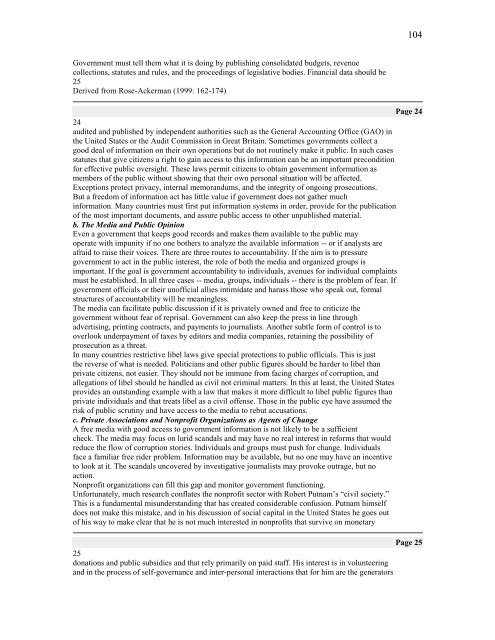FILSAFAT KORUPSI - Direktori File UPI
FILSAFAT KORUPSI - Direktori File UPI
FILSAFAT KORUPSI - Direktori File UPI
You also want an ePaper? Increase the reach of your titles
YUMPU automatically turns print PDFs into web optimized ePapers that Google loves.
Government must tell them what it is doing by publishing consolidated budgets, revenue<br />
collections, statutes and rules, and the proceedings of legislative bodies. Financial data should be<br />
25<br />
Derived from Rose-Ackerman (1999: 162-174)<br />
104<br />
Page 24<br />
24<br />
audited and published by independent authorities such as the General Accounting Office (GAO) in<br />
the United States or the Audit Commission in Great Britain. Sometimes governments collect a<br />
good deal of information on their own operations but do not routinely make it public. In such cases<br />
statutes that give citizens a right to gain access to this information can be an important precondition<br />
for effective public oversight. These laws permit citizens to obtain government information as<br />
members of the public without showing that their own personal situation will be affected.<br />
Exceptions protect privacy, internal memorandums, and the integrity of ongoing prosecutions.<br />
But a freedom of information act has little value if government does not gather much<br />
information. Many countries must first put information systems in order, provide for the publication<br />
of the most important documents, and assure public access to other unpublished material.<br />
b. The Media and Public Opinion<br />
Even a government that keeps good records and makes them available to the public may<br />
operate with impunity if no one bothers to analyze the available information -- or if analysts are<br />
afraid to raise their voices. There are three routes to accountability. If the aim is to pressure<br />
government to act in the public interest, the role of both the media and organized groups is<br />
important. If the goal is government accountability to individuals, avenues for individual complaints<br />
must be established. In all three cases -- media, groups, individuals -- there is the problem of fear. If<br />
government officials or their unofficial allies intimidate and harass those who speak out, formal<br />
structures of accountability will be meaningless.<br />
The media can facilitate public discussion if it is privately owned and free to criticize the<br />
government without fear of reprisal. Government can also keep the press in line through<br />
advertising, printing contracts, and payments to journalists. Another subtle form of control is to<br />
overlook underpayment of taxes by editors and media companies, retaining the possibility of<br />
prosecution as a threat.<br />
In many countries restrictive libel laws give special protections to public officials. This is just<br />
the reverse of what is needed. Politicians and other public figures should be harder to libel than<br />
private citizens, not easier. They should not be immune from facing charges of corruption, and<br />
allegations of libel should be handled as civil not criminal matters. In this at least, the United States<br />
provides an outstanding example with a law that makes it more difficult to libel public figures than<br />
private individuals and that treats libel as a civil offense. Those in the public eye have assumed the<br />
risk of public scrutiny and have access to the media to rebut accusations.<br />
c. Private Associations and Nonprofit Organizations as Agents of Change<br />
A free media with good access to government information is not likely to be a sufficient<br />
check. The media may focus on lurid scandals and may have no real interest in reforms that would<br />
reduce the flow of corruption stories. Individuals and groups must push for change. Individuals<br />
face a familiar free rider problem. Information may be available, but no one may have an incentive<br />
to look at it. The scandals uncovered by investigative journalists may provoke outrage, but no<br />
action.<br />
Nonprofit organizations can fill this gap and monitor government functioning.<br />
Unfortunately, much research conflates the nonprofit sector with Robert Putnam‘s ―civil society.‖<br />
This is a fundamental misunderstanding that has created considerable confusion. Putnam himself<br />
does not make this mistake, and in his discussion of social capital in the United States he goes out<br />
of his way to make clear that he is not much interested in nonprofits that survive on monetary<br />
25<br />
donations and public subsidies and that rely primarily on paid staff. His interest is in volunteering<br />
and in the process of self-governance and inter-personal interactions that for him are the generators<br />
Page 25

















